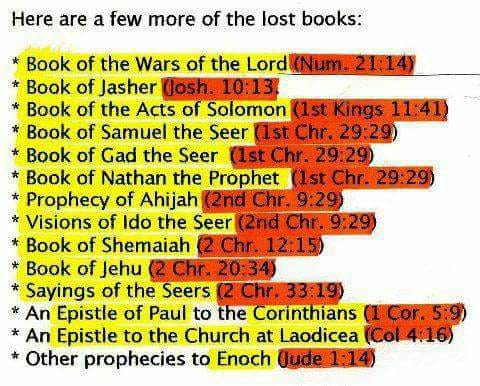by John McGlone Aug 10, 2018
ERRATA: *** CHANGES ENUMERATED Oct 4, 2023
I have always been intrigued by extra biblical books that are mentioned within canon of the Holy Bible that we have today. {I can only deduct that depending on the context they must also be Scripture and inspired by the Holy Ghost.}
ERRATA #1*** I am continuing to study these lost books mentioned in the Bible to consider their authenticity as references for the Christian faith. We believe any books worth studying as relevant to the 66 books verbal plenary inspiration must meet the following hermeneutical considerations to even press forward with more historical and forensic research.
FILTERS TO CONSIDER RESEARCHING LOST BOOKS OF THE BIBLE AS
VERBAL PLENARY INSPIRED SCRIPTURE
1. It must be mentioned in the Bible in historical text and context.
2. Must have historical/archaeological evidence to support itself. For example, the book of Enoch is found in the Qumran caves with the other canonized Scriptures.
3. law of non-contradiction, it can not contradict obvious salvation pending doctrines like prophecies, virgin birth, Jesus is God, etc.
4. recover by the power of the Holy Spirit any and all lost books or epistles that have been possibly removed from the canon. Our goal is never to add or take away from the 66.
5. We must do this by faith that the Holy Spirit leads us and teaches us on the matters of the book or letter that we are historically and archaeologically examining. ***
Rev 22:18-19 For I testify unto every man that heareth the words of the prophecy of this book, If any man shall add unto these things, God shall add unto him the plagues that are written in this book: And if any man shall take away from the words of the book of this prophecy, God shall take away his part out of the book of life, and out of the holy city, and from the things which are written in this book.
1 Tim 3:16-17
All scripture is given by inspiration of God, and is profitable for doctrine, for reproof, for correction, for instruction in righteousness: That the man of God may be perfect, throughly furnished unto all good works.
The below image I found on FB peaked my interest months ago and goes way beyond; Enoch, Jubliee, and other well known Apocryphal and/or ‘lost books’.
Num 21:14-16 Wherefore it is said in the book of the wars of the LORD, What he did in the Red sea, and in the brooks of Arnon, And at the stream of the brooks that goeth down to the dwelling of Ar, and lieth upon the border of Moab. And from thence they went to Beer: that is the well whereof the LORD spake unto Moses, Gather the people together, and I will give them water.
1 Cor 5:9 I wrote unto you in an epistle not to company with fornicators:
Col 4:16 And when this epistle is read among you, cause that it be read also in the church of the Laodiceans; and that ye likewise read the epistle from Laodicea.
Jude 1:14 And Enoch also, the seventh from Adam, prophesied of these, saying, Behold, the Lord cometh with ten thousands of his saints,…[prophecy from God is so detailed that it indicates it must have been written down previously.]
Last thoughts on this; 1. I have always believed that men have and will continue to add to, or take away from the Word of God therefore bring great damnation upon themselves. 2. The KJVO view is nullified by these additional writings if they are true. it’s first edition in 1611 which included the Apochrypha as inspired writings then removed them at later dates.** 3. There are many clarifying concepts that can be gleaned from some of these writings. 4. We need to discern by the Holy Ghost and not just accept something that may be spiritually dictated to us. 5. Reminds us to stay humble and not become high minded 6. All of these writings are prewritten before the Council of Nicea.
7. The Bible tells us that in the latter days, knowledge will increase. Will that be true of the saints of God as we see this quickly approaching storm called the Great Tribulation?
Rev 22:18-19 For I testify unto every man that heareth the words of the prophecy of this book, If any man shall add unto these things, God shall add unto him the plagues that are written in this book: And if any man shall take away from the words of the book of this prophecy, God shall take away his part out of the book of life, and out of the holy city, and from the things which are written in this book.
**The 80 books of the King James Version include 39 books of the Old Testament, 14 books of Apocrypha, and the 27 books of the New Testament. https://en.wikipedia.org/wiki/King_James_Version
***Though my view has not moved much on the inspiration of these lost books mentioned in the Bible, I am making space to facilitate the removal of stumbling blocks for some brethren.***
BLUE LETTER BIBLE RE: ENOCH 1
https://www.blueletterbible.org/faq/canon.cfm
The Book of Jude seemingly contains a quotation of the intertestamental Book of Enoch. The question results from a citation found in Jude 14.
Now Enoch, the seventh from Adam, prophesied about these men saying, ‘Behold, the Lord comes with ten thousands of His saints’ (Jude 14).
Jude records a prophecy made by Enoch, who lived before the flood of Noah. Enoch predicted the coming of the Lord to judge wicked individuals. The Apostle Paul wrote of this same judgment (2 Thessalonians 1:7-10). This prophecy made by Enoch is not recorded in the Old Testament. Two questions arise: (1) Where did Jude obtain his information? (2) Was Jude’s information correct?
During the period between the testaments the Book of Enoch was written. It contains this prophecy. Some assume that Jude obtained this prophecy from the Book of Enoch, but this is not the case. Jude does not quote from the Book of Enoch but rather directly from Enoch. This could have been by means of special revelation from God or from some now unknown written source. The source of Jude’s quotation was the person Enoch. Where the Book of Enoch derived his information is another matter. It is possible that the source of the quotation found in the Book of Enoch was Jude, since there is no evidence as to the precise contents of the Book of Enoch until several centuries after Jude was written. Whatever the answer may be. It is not necessary to assume that Jude considered the Book of Enoch as authoritative.
Since we believe that Jude’s writing was inspired by God, we take this information as being correct. It is not essential to know how Jude obtained this information. Jesus had promised that His disciples would be indwelt by the Holy Spirit, who would guide them into all truth.
However, when He, the Spirit of truth, has come, He will guide you into all truth; for He will not speak on His own authority, but whatever He hears He will speak (John 16:13).
Because of Jesus’ promise, the words of the New Testament writers were safeguarded from error.
We conclude that Jude did not quote from the Book of Enoch, but received the information in some other way.
MY RESPONSES TO BLB TEACHING ON THE BOOK OF 1 ENOCH
- They assert that Jude could have only been inspired by the Holy Ghost not from the manuscript of
1 Enoch. How do they know this? How do any of the scholars know this? How do we know this? Is it a possibility that it was regarded as inspired by the early believers in the 1st through the 4th centuries? Before the discovery of the Dead Sea Scrolls we didn’t have the script evidence to prove that at least there is such a book.



Please stay away from these books.